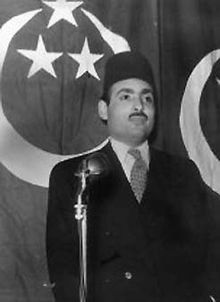Ahmed Hussein (1911–1982)
Ahmed Hussein | |
|---|---|
 Hussein during the inauguration of Young Egypt in 1933 | |
| Born | Ahmed Mahmoud Hussein 8 March 1911 |
| Died | 27 September 1982 (aged 71) |
| Occupation | Lawyer |
| Years active | 1929–1969 |
| Known for | Founder of Young Egypt Party |
| Relatives | Adel Hussein (brother) |
Ahmed Hussein (8 March 1911–27 September 1982) was an Egyptian lawyer and politician who founded a fascist-inspired Egyptian nationalist party, Young Egypt, in the 1930s.
Early life and education
[edit]Hussein was born on 8 March 1911.[1] His father, Mahmoud Hussein, was a civil servant at the Ministry of Finance. The family was from Kafr El Battikh near Damietta and had lands in Lower Egypt.[1]
Hussein received religious education and a degree in law.[2]
Career and political activities
[edit]
Hussein started a magazine entitled Al Sarkha (Arabic: Scream) in which he published a program of his political group, "Society of the Free Youth, Supporters of the Treaty", endorsing Prime Minister Mohamed Mahmoud's negotiations with the British.[1][3] The group included the nationalist Egyptian figures led by Hussein's friend Fathi Radwan.[4] The society's slogan was "God, Fatherland and the King", and aimed at reviving Egyptian nationalism, especially after Egypt experienced negative outcomes of the global economic crisis of 1929.[1] In late 1931, a committee of students headed by Ahmad Hussein initiated the Piastre Plan to raise funds to improve the industry in the country.[1] They managed to collect the funds and employed them to set up a fez factory.[1]
The Society of the Free Youth, Supporters of the Treaty was reestablished as a political party, Young Egypt, on 21 October 1933.[3][4] The party was modeled on the Italian National Fascist Party.[5] Hussein wrote an open letter to Hitler expressing his admiration while on a trip to Europe.[6] In his writings he described the Nazi Party's economic policies as an example for Egypt to follow, and described the Reichsarbeitsdienst as 'a return to true Islamic society, when there was no employer and no employee but all were brothers co-operating together.'[6] Hussein was arrested in July 1941 due to his extreme nationalist activities.[2] He escaped while he was being treated at a hospital, but in November 1942 he surrendered himself to the police.[2] In 1944 he was released from prison.[2] In July 1946 Hussein was again arrested with other Young Egypt party members following the headline of the party newspaper, Al-Ishtrakia, as "Revolt, Revolt, Revolt!"[7] They were freed on bail soon.[2]
Hussein renamed his party as the Egyptian Social Democratic Party in the late 1940s, and later it was renamed as the National Islamic Party.[2] In the 1950s his brother and a member of the Young Egypt party, Adel Hussein, joined a communist party, namely Haditu.[8]
Later life and death
[edit]Hussein had a stroke in 1969 and retired from public life.[9] He died at age 71 on 27 September 1982 after he had been hospitalized because of heart problems.[9]
References
[edit]- ^ a b c d e f James P. Jankowski (1975). Egypt's young rebels: "Young Egypt": 1933–1952. Stanford, CA: Hoover Institution Press. pp. 9, 11–13. ISBN 978-0-8179-1451-6.
- ^ a b c d e f "British Documents" (PDF). Nasser Library. 3 February 1950. p. 25. Retrieved 24 July 2022.
- ^ a b Fouad Fahmy Shafik (1981). The Press and Politics of Modern Egypt: 1798-1970. A Comparative Analysis of Causal Relationships (PhD thesis). New York University. p. 187. ISBN 9798661819062. ProQuest 303021068.
- ^ a b Josep Puig Montana (2013). "Oppositional movements in Egypt, from 1952 to Mubarak's downfall". Nómadas. Revista Crítica de Ciencias Sociales y Jurídicas. 39 (3): 39. doi:10.5209/rev_NOMA.2013.v39.n3.48329.
- ^ Patricia Peghini Ryan (1972). The Arab Socialist Union of Egypt (PhD thesis). West Virginia University. p. 17. ISBN 9798659245712. ProQuest 302593067.
- ^ a b Wild, Stefan (1985). "National Socialism in the Arab Near East Between 1933 and 1939". Die Welt des Islams. 25 (1–4): 126–170. doi:10.1163/157006085X00053. ISSN 0043-2539.
- ^ Henry C. Atyeo (November 1952). "Egyptian Nationalism". Current History. 23 (135): 314. JSTOR 45308290.
- ^ Tareq Y. Ismael; Rifaat El Said (1990). The Communist Movement in Egypt, 1920-1988. Syracuse, NY: Syracuse University Press. p. 75. ISBN 978-0-8156-2497-4.
- ^ a b "Ahmed Hussein". The New York Times. 27 September 1982. p. 9. Retrieved 24 July 2022.
External links
[edit] Media related to Ahmed Hussein (Egypt) at Wikimedia Commons
Media related to Ahmed Hussein (Egypt) at Wikimedia Commons


 French
French Deutsch
Deutsch